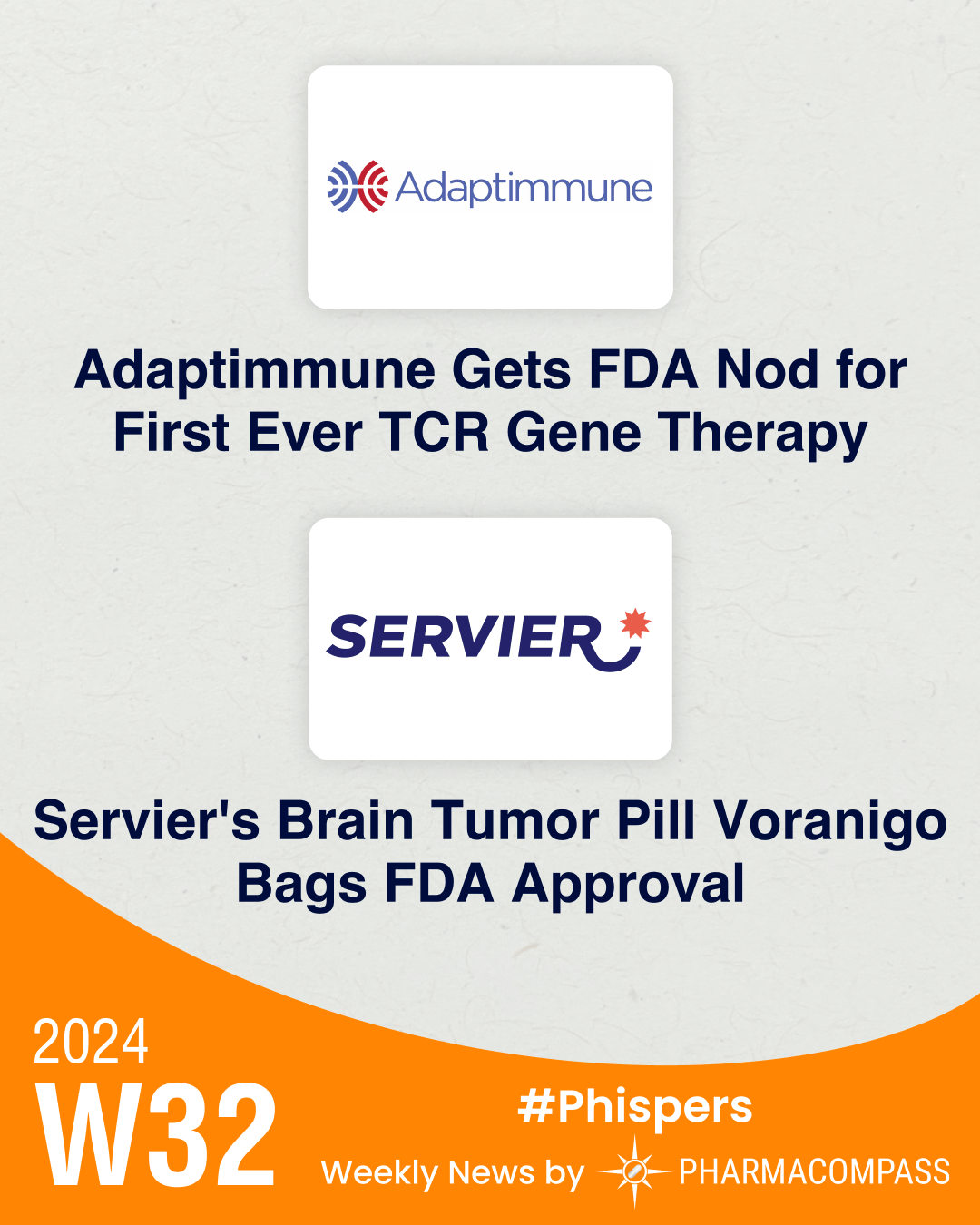
By PharmaCompass
2024-08-08
Impressions: 1,069 Article || 14 Video
This week, Adaptimmune clinched gold when it secured the first-ever US Food and Drug Administration (FDA) approval for a T-cell receptor gene therapy. Its drug Tecelra was okayed to treat a rare and aggressive cancer, known as synovial sarcoma, that often affects young people. FDA also expanded the label of GSK’s Jemperli in endometrial cancer.
Besides these approvals, the agency approved Servier’s drug for a certain kind of brain tumor, known as Grade 2 IDH-mutant gliom. It also granted accelerated approval to Novartis’ Fabhalta (iptacopan) to reduce excess protein in the urine of patients with primary immunoglobulin A nephropathy (IgAN) at risk of rapid disease progression.
In deals, Roche’s Genentech has signed a potential US$ 2 billion deal with Sangamo for novel genomic medicines. And Instil has signed a potential US$ 2 billion deal with ImmuneOnco for two cancer candidates.
The White House has said that China has imposed restrictions on chemicals critical to fentanyl production. And the Lacks family is suing Novartis and Viatris, alleging they unjustly profited from the genetic material of deceased Henrietta Lacks, without the family’s consent.
FDA grants accelerated approval to Adaptimmune’s gene therapy to cure rare cancer
FDA has granted accelerated approval to Adaptimmune’s first-of-its-kind therapy — Tecelra (afami-cel) — for a rare type of cancer that often affects young people. Synovial sarcoma is a potential life threatening soft-tissue sarcoma that usually develops in the extremities. This is the maiden FDA approval for Adaptimmune. Tecelra is the first ever T cell receptor (TCR) gene therapy approved by the FDA. It was okayed for certain patients whose cancer had spread and cannot be completely removed by surgery after they’ve been through chemotherapy. Tecelra is a one-time treatment listed at a whopping price of US$ 727,000.
Servier lands approval for first therapy to treat common type of brain tumor in US
FDA has approved Servier’s drug for a certain kind of brain tumor rendering it the first and only treatment in the US for the condition. The French drugmaker’s Voranigo (vorasidenib) was okayed to treat Grade 2 IDH-mutant glioma in patients 12 years and older following surgery. Gliomas are common types of brain cancers that can hinder the normal functioning of the brain. Voranigo offers the convenience of a once-daily pill to actively manage the disease.
FDA okays Novartis’ kidney disease drug: FDA has granted accelerated approval to Novartis’ Fabhalta (iptacopan) to reduce excess protein in the urine of patients with primary immunoglobulin A nephropathy (IgAN) at risk of rapid disease progression. Excess urine protein can be an indication of the kidney failing to properly filter and Novartis’ first-in-class drug reduced it by 43.8 percent compared to a placebo.
GSK scores broad endometrial cancer label expansion for Jemperli: FDA has expanded the label of GSK’s Jemperli in endometrial cancer. Jemperli has now bagged a broad approval as a first-line treatment for endometrial cancer, regardless of the biomarker status, when used in combination with chemotherapy. This includes patients with mismatch repair proficient (pMMR) or microsatellite-stable (MSS) tumors. Barely a month ago, FDA had okayed Merck’s Keytruda for a broad first-line endometrial cancer population.
Roche’s Genentech inks potential US$ 2 bn deal with Sangamo for Alzheimer’s
Roche, via its subsidiary Genentech, has secured exclusive rights to molecules from Sangamo Therapeutics designed to repress the gene that makes “tau,” a protein many scientists believe is a main driver of Alzheimer’s disease. The potential US$ 1.95 billion deal comprises other novel genomic medicines for neurodegenerative diseases. Also, a report in the Financial Times citing insiders said Roche is looking to divest its cancer data specialist Flatiron Health for US$ 1.2 billion. In 2018, Roche paid US$ 1.9 billion for Flatiron to speed up the development of cancer meds and help price them.
Instil in up to US$ 2 bn deal with ImmuneOnco for two cancer candidates: Dallas-based biotech Instil Bio has agreed to pay up to US$ 2 billion as well as US$ 50 million in upfront and near-term payments to China’s ImmuneOnco Biopharmaceuticals for two clinical-stage candidates.
Eisai inks deal with SEED: Eisai has inked a deal with SEED Therapeutics worth up to US$ 1.5 billion to develop novel molecular glue degraders for the treatment of neurodegenerative diseases and cancer. The drugs work by linking the body’s natural protein recycling machinery with the disease-causing protein.
Bayer scores phase 3 win as Kerendia cuts risk of cardiovascular death, heart failure
Bayer saw a key win with Kerendia (finerenone) showing it can reduce the risk of cardiovascular death, and first and recurrent heart failure events in a phase 3 trial. The German multinational is betting big on Kerendia and expects peak sales to the tune of € 3 billion (US$ 3.3 billion) from it.
Novartis, Viatris hit with lawsuit over stolen genetic material of Henrietta Lacks
The family of Henrietta Lacks has filed a lawsuit against Novartis and Viatris, alleging they unjustly profited from Lacks’ genetic material without her family’s consent. Lacks was an African-American woman whose cancer cells were the source of the first immortalized human cell line – a cell line that can reproduce indefinitely under specific conditions. The HeLa cell line derived from her cancer cells is one of the most important cell lines in medical research and a cornerstone in modern medicine that is accountable for an untold number of innovations, including polio and Covid vaccines. The HeLa cells were cut from Lacks’ cervix without her permission in 1951, while she was being treated at Johns Hopkins for cervical cancer. Her family has been on a quest to get compensation for her immortal HeLa cells.
US says China has imposed restrictions on chemicals critical to fentanyl production
According to the White House, China has imposed controls on the production of chemicals critical to making fentanyl. In April this year, the House China committee had accused the Asian country of subsidizing production of illicit fentanyl precursors for export. Fentanyl is the leading cause of death between the ages of 18 and 45 in the US.
The PharmaCompass Newsletter – Sign Up, Stay Ahead
Feedback, help us to improve. Click here
Image Credit : Phisper Infographic by PharmaCompass license under CC BY 2.0
“ The article is based on the information available in public and which the author believes to be true. The author is not disseminating any information, which the author believes or knows, is confidential or in conflict with the privacy of any person. The views expressed or information supplied through this article is mere opinion and observation of the author. The author does not intend to defame, insult or, cause loss or damage to anyone, in any manner, through this article.”







